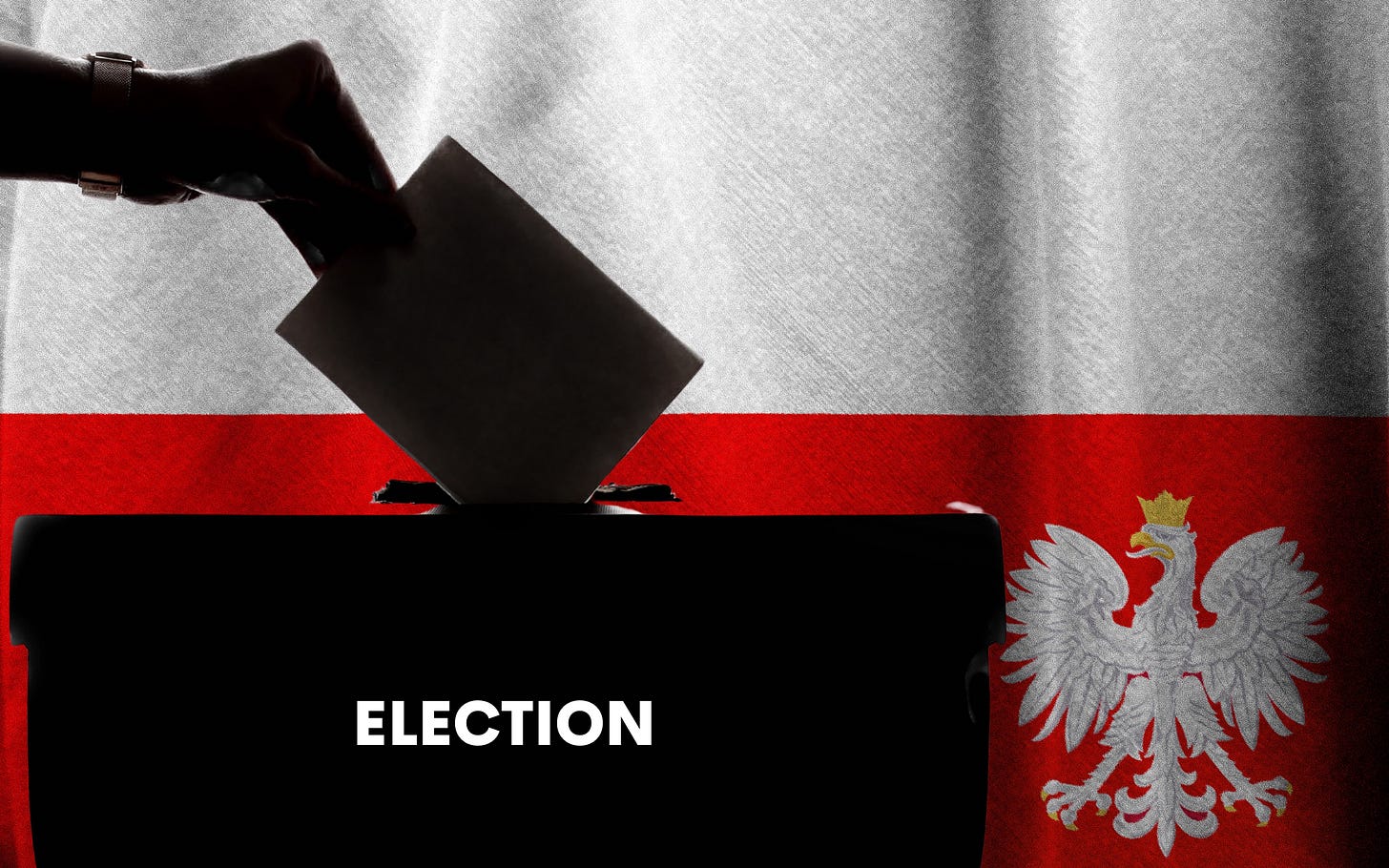Poland's Historic Election
The turn towards more moderate liberal democratic politics may well serve as a blueprint for other countries.
Now that the official results from Poland’s election are in, it seems very likely that the liberal pro-EU opposition grouping will form the next government, having collectively achieved a majority of seats in Poland’s parliament, the Sejm. The official voting results also show that voter turnout reached a historic high of 74.38%.
The largest liberal opposition party, The Civic Platform, headed by Donald Tusk, the former prime minister and president of the EU Council, secured 30.70% of the vote and 157 seats. They now look best placed to negotiate a new government together with their coalition partners, The Third Way who have achieved 14.4% of the vote and 65 seats and The New Left with 8.61% of the vote and 26 seats. Collectively the three parties achieved 248 seats in the 460-seat parliament, comfortably exceeding the 231 seats needed to form a majority government.
This really is a remarkable achievement for the opposition, surprising for many, given the odds that seemed to be stacked against them after reports of an unfree and unfair contest in the run-up to the election.
In this election, the erosion of women's rights and their role in society was a key campaign issue. On election day, almost 74% of women are reported to have turned out to vote. Meanwhile, young people turned up in large numbers and voted more often than not for the alternative liberal opposition grouping.
Almost 69% of eligible young people aged 29 or less voted, two-thirds of whom voted for the pro-EU opposition parties, according to reports. This is, I think, another example of the trend I have written about before where the younger generations of liberal-leaning Gen Z and Millennials are set to change the future of politics on both sides of the Atlantic in the coming years.
The outgoing right-wing national conservative party, Law and Justice (Pis), which has ruled Poland in an increasingly illiberal populist manner for the last eight years, still achieved the largest vote share of 35.38% in this election, giving them 194 seats. However, this was not enough to form a single majority government for the third consecutive occasion or to build a coalition government with the only other possible party, the right-wing Confederation party, which only achieved 7.16% of the vote for a total of 18 seats.
The outgoing government also faced setbacks when the four referendums it chose to hold on election day did not pass. One of the referendum questions provided a good example of its populist tendencies over the last number of years, asking voters the rather loaded question “Are you in favour of admitting thousands of illegal immigrants from the Middle East and Africa, in line with the forced relocation mechanism imposed by the European bureaucracy?”
In the Senate, the outgoing government also failed to win a majority, securing just 34 of a possible 100 seats. Meanwhile, the Civic Platform, The Third Way, and The New Left collectively secured 61 seats.
The next step will see Poland’s President Andrzej Duda consult with Poland’s key political parties about forming the country’s next government. On Thursday, an advisor to the president said on Polish radio that consultations would begin next week. The largest winning party, Law and Justice, will be the first to be invited.
It is likely that official talks about forming Poland’s next government will take at least a month or more. The new government will then have to cohabit with President Duda, who was previously elected with the support of with Law and Justice party, until his second and final term ends in 2025.
This election is among the most significant in the European Union this year. Poland with a population of just over 38 million people and a growing economy is a significant EU member state having joined in 2004. It is also a significant member of the NATO alliance and has so far played an important role in its assistance to Poland’s war-afflicted neighbour Ukraine. In the coming years, Poland will also have a significant role to play as the EU expands its membership eastwards.
This election is arguably the most important and historic within Poland since the 1989 elections when the Polish people managed to unshackle themselves from decades of oppressive communist rule. At the time, Poland was at an inflection point and its successful move towards liberal democracy inspired similar movements in other Eastern Bloc countries.
This election should also be understood as a new inflection point where Polish liberal democracy and its role within the EU were arguably on the ballot. From the EU perspective, Poland is back. Many in Brussels, Strasbourg, and EU capitals will be delighted with these Polish election results. In recent years, it has been widely reported that the Law and Justice party had governed Poland in a way that was out of sync with EU norms, tending to move away from the post-communist principles of liberal democracy.
With reports of reductions in the independence of the country’s judicial system and media, the question of if Poland was becoming more authoritarian had been posed in the European press. Indeed, concerns about Poland’s drift towards authoritarianism under the Law and Justice party’s rule have been raised for a number of years. For example, in 2018 one academic argued that “Poland is steadily becoming an authoritarian, xenophobic pariah among democratic nations”.
More damningly, the outgoing head of Poland's Supreme Court, Prof Malgorzata Gersdorf, was reported as saying in 2020 that the nationalist ruling Law and Justice Party (PiS) was moving the country towards an authoritarian state.
In 2021, the government in Warsaw found itself at odds with EU law when the Court of Justice of the European Union ordered Poland to pay the European Commission a fine of €1 million per day following its failure to halt the implementation of specific national laws pertaining to the jurisdiction of the Disciplinary Chamber of Poland’s Supreme Court. In its ruling, the EU court argued, “It necessary in order to avoid serious and irreparable harm to the legal order of the European Union and to the values on which that Union is founded, in particular that of the rule of law”.
If a new liberal civic coalition government does come to power in Poland as is now widely anticipated, then it should be expected to govern closer to the political centre. It is also anticipated that the new government will work on repairing the country's weakened liberal democracy and its damaged relationship and reputation with the EU’s institutions and member states.
If it proves successful, Poland’s new turn towards more moderate liberal democratic politics may well serve as a blueprint for other EU countries and those further afield, whose liberal democracies have been eroded by illiberal and authoritarian tendencies in recent years.
You may also like: The European Union is set to Enlarge, Why Gen Z and Millennials are Going to Change the Future of Politics, Untangling the Difference Between Populism and Nationalism and Why It Matters
#politics #elections #europe





As always, I would like to hear what you have to say. Drop me a few lines and let me know your thoughts on today's subject.